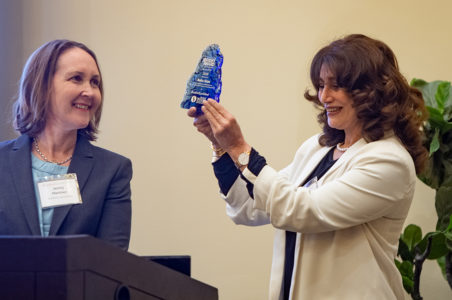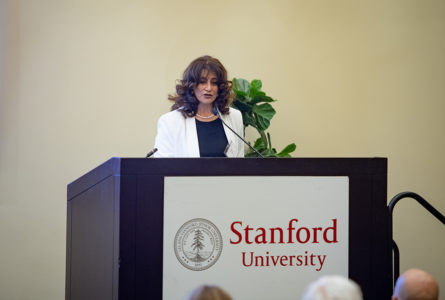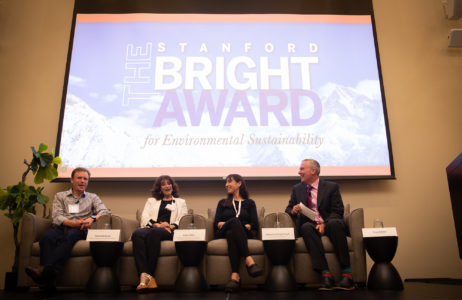Stanford Law School Hosts Mountain Guardian and Bright Award Winner, Aisha Khan
Preserving the mountain regions of Pakistan and all at-risk mountain regions around the world, while providing help to communities impacted by climate change in those areas, was the main topic of discussion at this year’s Bright Award event at Stanford Law School on October 3, 2019.
After witnessing firsthand the environmental degradation of Pakistan’s Karakoram Mountain Range in 2001, Aisha Khan decided to take matters into her own hands by establishing the Mountain & Glacier Protection Organization (MGPO). Eighteen years later (and after founding additional environmental organizations, including the Civil Society Coalition for Climate Change, a membership-based networking platform that connects individuals and organizations concerned about climate change in Pakistan), in recognition of her multifaceted efforts to preserve the mountain regions of Pakistan and empower their people, Khan was presented with the 2019 Stanford Bright Award at this year’s ceremony in front of a large and enthusiastic audience.

Stanford awards the Bright Award each year to an individual who has made exceptional contributions to global sustainability. The $100,000 award is given to an individual or individuals from one of ten rotating regions, which so far have included the Middle East, West Asia, Africa, Europe, South America, and North America.
“We are grateful to the Bright family for entrusting Stanford with finding unsung heroes of environmental conservation, giving them the recognition they deserve and providing them with the resources and attention they need to take their work to the next level,” said Jenny Martinez, the Richard E. Lang Professor of Law and Dean of Stanford Law School.
Preserving the Environment, Saving Communities and Empowering Women and Youth
Khan was recognized for her work to lead and coordinate multiple efforts to restore and preserve the high mountain regions of Pakistan in ways that benefit local economies and empower their people. She also brought together organizations, individuals and governments in what she calls a “whole society approach” to combat climate change in Pakistan.
The first organization that Khan founded, MGPO, is a social welfare, nonprofit organization focusing on the impact of climate change in the mountainous regions of Pakistan that also strives to enhance the quality of life of local disadvantaged communities by building physical infrastructure and by providing them with improved access to education and healthcare services.

“I feel a special gratitude for those who believed in me and supported my work when I was striving to make a difference with nothing other than passion to guide my actions,” said Khan. “I never thought of winning an award or getting recognition for the work I do but now that it has come, I have to admit that it feels very good.”
The award ceremony brought together faculty, students, and local community members in an engaging panel discussion, “Climate Change Impacts on Vulnerable Communities,” hosted by Climate One founder Greg Dalton. Other panelists at the event included Gabrielle Wong-Parodi, Assistant Professor of Earth System Science and Marshall Burke, both assistant professors of Earth System Science at Stanford University. In the discussion, Khan explained the importance of including women and youth in climate projects and how that can be controversial in the traditionally male-dominated societies in which MGPO often works.

“Transforming social values and age-old tradition is not easy,” said Khan. “But, my conviction that complex issues in a changing environment require all sectors and all actors to collaborate, consult, engage and work with and through each other, helps me to pursue this agenda.”
Buzz Thompson, Robert E. Paradise Professor in Natural Resources Law and senior fellow at the Stanford Woods Institute for the Environment, who leads the Bright Award nominating committee, called this year’s recipient a “trusted messenger” of conservation and preservation to the at-risk communities she serves.
At the conclusion of the event, Khan remarked on the crucial role that the youth have in the discussion of climate change in Pakistan and around the world. “It is the young people who have to do everything, really,” said Khan. “They need to declare, ‘This is our future that you’re playing with!’ They need to persistently ask what kind of world will be left for them.
“If we believe in one humanity, and shared responsibility, and prosperity that leaves no one behind, then every action from now on that we take has to build on the principles of social, ecological, and democratic equity,” concluded Khan.

